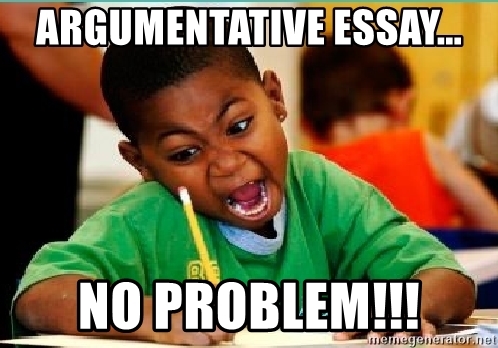

AP English Language and Composition
Course features:.
- Recommended Grade Level: 9-12
- Course Credits: 1
- Course Price: $299.00
Course Overview:
An Advanced Placement course in English Language and Composition engages students in becoming skilled readers of prose written in a variety of periods, disciplines, and rhetorical contexts and in becoming skilled writers who compose for a variety of purposes. Both their writing and their reading should make students aware of the interactions among a writer’s purposes, audience expectations, and subjects as well as the way generic conventions and the resources of language contribute to effectiveness in writing. The college composition course for which the AP English Language and Composition course substitutes is one of the most varied in the curriculum.
Required Materials:
You will need the following items to complete this course:
- Disk space on your computer, as well as an external device to back up your files (flash drive, external hard drive, CD-Rom, etc.)
- Word processing and presentation software
- It is recommended that students purchase a test preparation book to work on independently. Speak to your instructor about which test prep book might be most appropriate.
- Students will need to obtain the following texts, either from a library or a bookseller:
Segment One:
- Civil War Edition: Choose one of the following:
- Zen in the Art of Writing by Ray Bradbury
- On Writing Well by William Zinsser
Segment Two:
Contemporary Edition: See the lesson entitled The Memoir for an overview of text choices and choose one of the following:
- **Narrative of the Life of Frederick Douglass by Frederick Douglass
- *A Work in Progress: A Memoir by Connor Franta
- The Reason I Jump: The Inner Voice of a Thirteen-Year-Old Boy with Autism by Naoki Higashida
- *The Color of Water: A Black Man's Tribute to His White Mother by James McBride
- *The Glass Castle: A Memoir by Jeannette Walls
- *I am Malala: The Girl Who Stood Up for Education and Was Shot by the Taliban by Malala Yousafza
- *I Know Why the Caged Bird Sings by Maya Angelou
- Dust Tracks on a Road by Zora Neale Hurston
- ***Incidents in the Life of a Slave Girl by Harriet Jacobs
- **The Story of My Life by Helen Keller
Student Edition: See the Checklist lesson for an overview of text choices and choose one of the following:
- Pilgrim at Tinker Creek by Annie Dillard
- *Nickel and Dimed: On (Not) Getting By in America by Barbara Ehrenreich
- Mountains Beyond Mountains: The Quest of Dr. Paul Farmer, A Man Who Would Cure the World by Tracy Kidder
- *The Devil in the White City: Murder, Magic, and Madness at the Fair that Changed America by Erik Larson
- **Up from Slavery: An Autobiography by Booker T. Washington
- Into Thin Air by Jon Krakauer
- The Immortal Life of Henrietta Lacks by Rebecca Skloot
- Warmth of Other Suns by Isabell Wilkerson
- Bury My Heart At Wounded Knee by Dee Brown
- The Boys in the Boat by Daniel James Brown
* All works have rhetorical merit for the AP English student; texts marked with asterisks deal with mature subject matter or contain adult language or situations. If this is a concern for you or your family, please choose a different text from the list.
** This text can be read online.
Early Edition
- 01.00 Early Edition: Checklist
- 01.01 AP English Language and Composition Overview
- 01.02 Analyzing Texts
- 01.03 Claims and Evidence
- 01.04 Introduction to Rhetorical Strategies
- 01.05 Critical Reading and Rhetorical Analysis
- 01.06 The Free Response
- 01.07 Evaluating Student Responses
- 01.08 Early Edition: Discussion-Based Assessment
Revolutionary Edition
- 02.00 Revolutionary Edition: Checklist
- 02.01 Historical Context: Writers React
- 02.02 Introduction to Argument
- 02.03 Structure as Rhetorical Strategy
- 02.04 Supporting the Argument
- 02.05 Evaluating Arguments
- 02.06 Aphorisms
- 02.07 Tone and Argument
- 02.08 AP Practice Essay One
- 02.09 Crafting Compound and Complex Sentences
- 02.10 Revolutionary Edition: Discussion-Based Assessment
- 02.11 AP Practice Essay Two
Romantic Edition
- 03.00 Romantic Edition: Checklist
- 03.01 Multiple Choice: Reader and Writer
- 03.02 Figurative Language in Argument
- 03.03 The Power of Diction
- 03.04 Taking a Position
- 03.05 Establishing a Line of Reasoning
- 03.06 Analyzing Syntax
- 03.07 AP Practice Essay Three
- 03.08 Crafting Periodic and Loose Sentences
- 03.09 Developing Commentary
- 03.10 Romantic Edition: Discussion-Based Assessment
Civil War Edition
- 04.00 Civil War Edition: Checklist
- 04.01 Multiple Choice: Read Stems First
- 04.02 Reading About Writing
- 04.03 Elements of Style
- 04.04 AP Practice Essay Four
- 04.05 Speech Analysis
- 04.06 Multiple Choice: Predict the Answer
- 04.07 Analyzing Style
- 04.08 Civil War Edition: Discussion-Based Assessment
- 04.09 Crafting Periodic and Balanced Sentences
- 04.10 AP Practice Essay Five
- 04.11 Reading and Synthesis
- 04.12 Nonfiction Book Journal
- 04.13 Segment One Exam
Realism Edition
- 05.00 Realism Edition: Checklist
- 05.01 Understanding Satire
- 05.02 Political Cartoons
- 05.03 "A Modest Proposal"
- 05.04 That's So Ironic
- 05.05 Irony to Ignite
- 05.06 Analyzing Satire
- 05.07 Exploring the Satirical Prompt
- 05.08 Multiple Choice: Find the Focus
- 05.09 AP Practice Essay Six
- 05.10 Crafting Chiasmus and Anaphora
- 05.11 AP Practice Essay Seven
- 05.12 Realism Edition: Discussion-Based Assessment
Modern Edition
- 06.00 Modern Edition: Checklist
- 06.01 Multiple Choice: Eliminate Answer Choices
- 06.02 Meet the Synthesis Essay
- 06.03 Conversations and Claims
- 06.04 Synthesizing the Voices of the Harlem Renaissance
- 06.05 Cultivating Commentary Using Sources
- 06.06 An Image is Worth 1,000 Words
- 06.07 Evaluating Student Responses
- 06.08 Planning a Response
- 06.09 Modern Edition: Discussion-Based Assessment
- 06.10 Crafting Purposeful Structure
- 06.11 AP Practice Essay Eight
Contemporary Edition
- 07.00 Contemporary Edition: Checklist
- 07.01 Multiple Choice: Putting It All Together
- 07.02 The Memoir
- 07.03 Appeals in Argument
- 07.04 AP Practice Essay Nine
- 07.05 Rhetoric in Action
- 07.06 AP Practice Essay Ten
- 07.07 Evaluate and Implement
- 07.08 AP Practice Essay Eleven
- 07.09 Crafting Sentence Variety
- 07.10 Memoir Journal
- 07.11 Contemporary Edition: Discussion-Based Assessment
Student Edition
- 08.00 Student Edition: Checklist
- 08.01 Research the Context
- 08.02 Analyze the Author's Choices
- 08.03 Argue an Issue
- 08.04 Pick a Perspective
- 08.05 Create a Connection
- 08.06 Interpret Rhetorical Strategies
- 08.07 Student Edition: Discussion-Based Assessment
- 08.08 Segment Two Exam
Awards, Approvals, and Accreditation

© 2024 - RedComet.org. All rights reserved.

Choose Your Test
- Search Blogs By Category
- College Admissions
- AP and IB Exams
- GPA and Coursework
3 Key Tips for How to Write an Argumentative Essay
General Education

If there’s one writing skill you need to have in your toolkit for standardized tests, AP exams, and college-level writing, it’s the ability to make a persuasive argument. Effectively arguing for a position on a topic or issue isn’t just for the debate team— it’s for anyone who wants to ace the essay portion of an exam or make As in college courses.
To give you everything you need to know about how to write an argumentative essay , we’re going to answer the following questions for you:
- What is an argumentative essay?
- How should an argumentative essay be structured?
- How do I write a strong argument?
- What’s an example of a strong argumentative essay?
- What are the top takeaways for writing argumentative papers?
By the end of this article, you’ll be prepped and ready to write a great argumentative essay yourself!
Now, let’s break this down.

What Is an Argumentative Essay?
An argumentative essay is a type of writing that presents the writer’s position or stance on a specific topic and uses evidence to support that position. The goal of an argumentative essay is to convince your reader that your position is logical, ethical, and, ultimately, right . In argumentative essays, writers accomplish this by writing:
- A clear, persuasive thesis statement in the introduction paragraph
- Body paragraphs that use evidence and explanations to support the thesis statement
- A paragraph addressing opposing positions on the topic—when appropriate
- A conclusion that gives the audience something meaningful to think about.
Introduction, body paragraphs, and a conclusion: these are the main sections of an argumentative essay. Those probably sound familiar. Where does arguing come into all of this, though? It’s not like you’re having a shouting match with your little brother across the dinner table. You’re just writing words down on a page!
...or are you? Even though writing papers can feel like a lonely process, one of the most important things you can do to be successful in argumentative writing is to think about your argument as participating in a larger conversation . For one thing, you’re going to be responding to the ideas of others as you write your argument. And when you’re done writing, someone—a teacher, a professor, or exam scorer—is going to be reading and evaluating your argument.
If you want to make a strong argument on any topic, you have to get informed about what’s already been said on that topic . That includes researching the different views and positions, figuring out what evidence has been produced, and learning the history of the topic. That means—you guessed it!—argumentative essays almost always require you to incorporate outside sources into your writing.

What Makes Argumentative Essays Unique?
Argumentative essays are different from other types of essays for one main reason: in an argumentative essay, you decide what the argument will be . Some types of essays, like summaries or syntheses, don’t want you to show your stance on the topic—they want you to remain unbiased and neutral.
In argumentative essays, you’re presenting your point of view as the writer and, sometimes, choosing the topic you’ll be arguing about. You just want to make sure that that point of view comes across as informed, well-reasoned, and persuasive.
Another thing about argumentative essays: they’re often longer than other types of essays. Why, you ask? Because it takes time to develop an effective argument. If your argument is going to be persuasive to readers, you have to address multiple points that support your argument, acknowledge counterpoints, and provide enough evidence and explanations to convince your reader that your points are valid.

Our 3 Best Tips for Picking a Great Argumentative Topic
The first step to writing an argumentative essay deciding what to write about! Choosing a topic for your argumentative essay might seem daunting, though. It can feel like you could make an argument about anything under the sun. For example, you could write an argumentative essay about how cats are way cooler than dogs, right?
It’s not quite that simple . Here are some strategies for choosing a topic that serves as a solid foundation for a strong argument.
Choose a Topic That Can Be Supported With Evidence
First, you want to make sure the topic you choose allows you to make a claim that can be supported by evidence that’s considered credible and appropriate for the subject matter ...and, unfortunately, your personal opinions or that Buzzfeed quiz you took last week don’t quite make the cut.
Some topics—like whether cats or dogs are cooler—can generate heated arguments, but at the end of the day, any argument you make on that topic is just going to be a matter of opinion. You have to pick a topic that allows you to take a position that can be supported by actual, researched evidence.
(Quick note: you could write an argumentative paper over the general idea that dogs are better than cats—or visa versa!—if you’re a) more specific and b) choose an idea that has some scientific research behind it. For example, a strong argumentative topic could be proving that dogs make better assistance animals than cats do.)
You also don’t want to make an argument about a topic that’s already a proven fact, like that drinking water is good for you. While some people might dislike the taste of water, there is an overwhelming body of evidence that proves—beyond the shadow of a doubt—that drinking water is a key part of good health.
To avoid choosing a topic that’s either unprovable or already proven, try brainstorming some issues that have recently been discussed in the news, that you’ve seen people debating on social media, or that affect your local community. If you explore those outlets for potential topics, you’ll likely stumble upon something that piques your audience’s interest as well.
Choose a Topic That You Find Interesting
Topics that have local, national, or global relevance often also resonate with us on a personal level. Consider choosing a topic that holds a connection between something you know or care about and something that is relevant to the rest of society. These don’t have to be super serious issues, but they should be topics that are timely and significant.
For example, if you are a huge football fan, a great argumentative topic for you might be arguing whether football leagues need to do more to prevent concussions . Is this as “important” an issue as climate change? No, but it’s still a timely topic that affects many people. And not only is this a great argumentative topic: you also get to write about one of your passions! Ultimately, if you’re working with a topic you enjoy, you’ll have more to say—and probably write a better essay .
Choose a Topic That Doesn’t Get You Too Heated
Another word of caution on choosing a topic for an argumentative paper: while it can be effective to choose a topic that matters to you personally, you also want to make sure you’re choosing a topic that you can keep your cool over. You’ve got to be able to stay unemotional, interpret the evidence persuasively, and, when appropriate, discuss opposing points of view without getting too salty.
In some situations, choosing a topic for your argumentative paper won’t be an issue at all: the test or exam will choose it for you . In that case, you’ve got to do the best you can with what you’re given.
In the next sections, we’re going to break down how to write any argumentative essay —regardless of whether you get to choose your own topic or have one assigned to you! Our expert tips and tricks will make sure that you’re knocking your paper out of the park.

The Thesis: The Argumentative Essay’s Backbone
You’ve chosen a topic or, more likely, read the exam question telling you to defend, challenge, or qualify a claim on an assigned topic. What do you do now?
You establish your position on the topic by writing a killer thesis statement ! The thesis statement, sometimes just called “the thesis,” is the backbone of your argument, the north star that keeps you oriented as you develop your main points, the—well, you get the idea.
In more concrete terms, a thesis statement conveys your point of view on your topic, usually in one sentence toward the end of your introduction paragraph . It’s very important that you state your point of view in your thesis statement in an argumentative way—in other words, it should state a point of view that is debatable.
And since your thesis statement is going to present your argument on the topic, it’s the thing that you’ll spend the rest of your argumentative paper defending. That’s where persuasion comes in. Your thesis statement tells your reader what your argument is, then the rest of your essay shows and explains why your argument is logical.
Why does an argumentative essay need a thesis, though? Well, the thesis statement—the sentence with your main claim—is actually the entire point of an argumentative essay. If you don’t clearly state an arguable claim at the beginning of your paper, then it’s not an argumentative essay. No thesis statement = no argumentative essay. Got it?
Other types of essays that you’re familiar with might simply use a thesis statement to forecast what the rest of the essay is going to discuss or to communicate what the topic is. That’s not the case here. If your thesis statement doesn’t make a claim or establish your position, you’ll need to go back to the drawing board.
Example Thesis Statements
Here are a couple of examples of thesis statements that aren’t argumentative and thesis statements that are argumentative
The sky is blue.
The thesis statement above conveys a fact, not a claim, so it’s not argumentative.
To keep the sky blue, governments must pass clean air legislation and regulate emissions.
The second example states a position on a topic. What’s the topic in that second sentence? The best way to keep the sky blue. And what position is being conveyed? That the best way to keep the sky blue is by passing clean air legislation and regulating emissions.
Some people would probably respond to that thesis statement with gusto: “No! Governments should not pass clean air legislation and regulate emissions! That infringes on my right to pollute the earth!” And there you have it: a thesis statement that presents a clear, debatable position on a topic.
Here’s one more set of thesis statement examples, just to throw in a little variety:
Spirituality and otherworldliness characterize A$AP Rocky’s portrayals of urban life and the American Dream in his rap songs and music videos.
The statement above is another example that isn’t argumentative, but you could write a really interesting analytical essay with that thesis statement. Long live A$AP! Now here’s another one that is argumentative:
To give students an understanding of the role of the American Dream in contemporary life, teachers should incorporate pop culture, like the music of A$AP Rocky, into their lessons and curriculum.
The argument in this one? Teachers should incorporate more relevant pop culture texts into their curriculum.
This thesis statement also gives a specific reason for making the argument above: To give students an understanding of the role of the American Dream in contemporary life. If you can let your reader know why you’re making your argument in your thesis statement, it will help them understand your argument better.

An actual image of you killing your argumentative essay prompts after reading this article!
Breaking Down the Sections of An Argumentative Essay
Now that you know how to pick a topic for an argumentative essay and how to make a strong claim on your topic in a thesis statement, you’re ready to think about writing the other sections of an argumentative essay. These are the parts that will flesh out your argument and support the claim you made in your thesis statement.
Like other types of essays, argumentative essays typically have three main sections: the introduction, the body, and the conclusion. Within those sections, there are some key elements that a reader—and especially an exam scorer or professor—is always going to expect you to include.
Let’s look at a quick outline of those three sections with their essential pieces here:
- Introduction paragraph with a thesis statement (which we just talked about)
- Support Point #1 with evidence
- Explain/interpret the evidence with your own, original commentary (AKA, the fun part!)
- Support Point #2 with evidence
- Explain/interpret the evidence with your own, original commentary
- Support Point #3 with evidence
- New paragraph addressing opposing viewpoints (more on this later!)
- Concluding paragraph
Now, there are some key concepts in those sections that you’ve got to understand if you’re going to master how to write an argumentative essay. To make the most of the body section, you have to know how to support your claim (your thesis statement), what evidence and explanations are and when you should use them, and how and when to address opposing viewpoints. To finish strong, you’ve got to have a strategy for writing a stellar conclusion.
This probably feels like a big deal! The body and conclusion make up most of the essay, right? Let’s get down to it, then.

How to Write a Strong Argument
Once you have your topic and thesis, you’re ready for the hard part: actually writing your argument. If you make strategic choices—like the ones we’re about to talk about—writing a strong argumentative essay won’t feel so difficult.
There are three main areas where you want to focus your energy as you develop a strategy for how to write an argumentative essay: supporting your claim—your thesis statement—in your essay, addressing other viewpoints on your topic, and writing a solid conclusion. If you put thought and effort into these three things, you’re much more likely to write an argumentative essay that’s engaging, persuasive, and memorable...aka A+ material.
Focus Area 1: Supporting Your Claim With Evidence and Explanations
So you’ve chosen your topic, decided what your position will be, and written a thesis statement. But like we see in comment threads across the Internet, if you make a claim and don’t back it up with evidence, what do people say? “Where’s your proof?” “Show me the facts!” “Do you have any evidence to support that claim?”
Of course you’ve done your research like we talked about. Supporting your claim in your thesis statement is where that research comes in handy.
You can’t just use your research to state the facts, though. Remember your reader? They’re going to expect you to do some of the dirty work of interpreting the evidence for them. That’s why it’s important to know the difference between evidence and explanations, and how and when to use both in your argumentative essay.
What Evidence Is and When You Should Use It
Evidence can be material from any authoritative and credible outside source that supports your position on your topic. In some cases, evidence can come in the form of photos, video footage, or audio recordings. In other cases, you might be pulling reasons, facts, or statistics from news media articles, public policy, or scholarly books or journals.
There are some clues you can look for that indicate whether or not a source is credible , such as whether:
- The website where you found the source ends in .edu, .gov, or .org
- The source was published by a university press
- The source was published in a peer-reviewed journal
- The authors did extensive research to support the claims they make in the source
This is just a short list of some of the clues that a source is likely a credible one, but just because a source was published by a prestigious press or the authors all have PhDs doesn’t necessarily mean it is the best piece of evidence for you to use to support your argument.
In addition to evaluating the source’s credibility, you’ve got to consider what types of evidence might come across as most persuasive in the context of the argument you’re making and who your readers are. In other words, stepping back and getting a bird’s eye view of the entire context of your argumentative paper is key to choosing evidence that will strengthen your argument.
On some exams, like the AP exams , you may be given pretty strict parameters for what evidence to use and how to use it. You might be given six short readings that all address the same topic, have 15 minutes to read them, then be required to pull material from a minimum of three of the short readings to support your claim in an argumentative essay.
When the sources are handed to you like that, be sure to take notes that will help you pick out evidence as you read. Highlight, underline, put checkmarks in the margins of your exam . . . do whatever you need to do to begin identifying the material that you find most helpful or relevant. Those highlights and check marks might just turn into your quotes, paraphrases, or summaries of evidence in your completed exam essay.
What Explanations Are and When You Should Use Them
Now you know that taking a strategic mindset toward evidence and explanations is critical to grasping how to write an argumentative essay. Unfortunately, evidence doesn’t speak for itself. While it may be obvious to you, the researcher and writer, how the pieces of evidence you’ve included are relevant to your audience, it might not be as obvious to your reader.
That’s where explanations—or analysis, or interpretations—come in. You never want to just stick some quotes from an article into your paragraph and call it a day. You do want to interpret the evidence you’ve included to show your reader how that evidence supports your claim.
Now, that doesn’t mean you’re going to be saying, “This piece of evidence supports my argument because...”. Instead, you want to comment on the evidence in a way that helps your reader see how it supports the position you stated in your thesis. We’ll talk more about how to do this when we show you an example of a strong body paragraph from an argumentative essay here in a bit.
Understanding how to incorporate evidence and explanations to your advantage is really important. Here’s why: when you’re writing an argumentative essay, particularly on standardized tests or the AP exam, the exam scorers can’t penalize you for the position you take. Instead, their evaluation is going to focus on the way you incorporated evidence and explained it in your essay.


Focus Area 2: How—and When—to Address Other Viewpoints
Why would we be making arguments at all if there weren’t multiple views out there on a given topic? As you do research and consider the background surrounding your topic, you’ll probably come across arguments that stand in direct opposition to your position.
Oftentimes, teachers will ask you to “address the opposition” in your argumentative essay. What does that mean, though, to “ address the opposition ?”
Opposing viewpoints function kind of like an elephant in the room. Your audience knows they’re there. In fact, your audience might even buy into an opposing viewpoint and be waiting for you to show them why your viewpoint is better. If you don’t, it means that you’ll have a hard time convincing your audience to buy your argument.
Addressing the opposition is a balancing act: you don’t want to undermine your own argument, but you don’t want to dismiss the validity of opposing viewpoints out-of-hand or ignore them altogether, which can also undermine your argument.
This isn’t the only acceptable approach, but it’s common practice to wait to address the opposition until close to the end of an argumentative essay. But why?
Well, waiting to present an opposing viewpoint until after you’ve thoroughly supported your own argument is strategic. You aren’t going to go into great detail discussing the opposing viewpoint: you’re going to explain what that viewpoint is fairly, but you’re also going to point out what’s wrong with it.
It can also be effective to read the opposition through the lens of your own argument and the evidence you’ve used to support it. If the evidence you’ve already included supports your argument, it probably doesn’t support the opposing viewpoint. Without being too obvious, it might be worth pointing this out when you address the opposition.

Focus Area #3: Writing the Conclusion
It’s common to conclude an argumentative essay by reiterating the thesis statement in some way, either by reminding the reader what the overarching argument was in the first place or by reviewing the main points and evidence that you covered.
You don’t just want to restate your thesis statement and review your main points and call it a day, though. So much has happened since you stated your thesis in the introduction! And why waste a whole paragraph—the very last thing your audience is going to read—on just repeating yourself?
Here’s an approach to the conclusion that can give your audience a fresh perspective on your argument: reinterpret your thesis statement for them in light of all the evidence and explanations you’ve provided. Think about how your readers might read your thesis statement in a new light now that they’ve heard your whole argument out.
That’s what you want to leave your audience with as you conclude your argumentative paper: a brief explanation of why all that arguing mattered in the first place. If you can give your audience something to continue pondering after they’ve read your argument, that’s even better.
One thing you want to avoid in your conclusion, though: presenting new supporting points or new evidence. That can just be confusing for your reader. Stick to telling your reader why the argument you’ve already made matters, and your argument will stick with your reader.

A Strong Argumentative Essay: Examples
For some aspiring argumentative essay writers, showing is better than telling. To show rather than tell you what makes a strong argumentative essay, we’ve provided three examples of possible body paragraphs for an argumentative essay below.
Think of these example paragraphs as taking on the form of the “Argumentative Point #1 → Evidence —> Explanation —> Repeat” process we talked through earlier. It’s always nice to be able to compare examples, so we’ve included three paragraphs from an argumentative paper ranging from poor (or needs a lot of improvement, if you’re feeling generous), to better, to best.
All of the example paragraphs are for an essay with this thesis statement:
Thesis Statement: In order to most effectively protect user data and combat the spread of disinformation, the U.S. government should implement more stringent regulations of Facebook and other social media outlets.
As you read the examples, think about what makes them different, and what makes the “best” paragraph more effective than the “better” and “poor” paragraphs. Here we go:
A Poor Argument
Example Body Paragraph: Data mining has affected a lot of people in recent years. Facebook has 2.23 billion users from around the world, and though it would take a huge amount of time and effort to make sure a company as big as Facebook was complying with privacy regulations in countries across the globe, adopting a common framework for privacy regulation in more countries would be the first step. In fact, Mark Zuckerberg himself supports adopting a global framework for privacy and data protection, which would protect more users than before.
What’s Wrong With This Example?
First, let’s look at the thesis statement. Ask yourself: does this make a claim that some people might agree with, but others might disagree with?
The answer is yes. Some people probably think that Facebook should be regulated, while others might believe that’s too much government intervention. Also, there are definitely good, reliable sources out there that will help this writer prove their argument. So this paper is off to a strong start!
Unfortunately, this writer doesn’t do a great job proving their thesis in their body paragraph. First, the topic sentence—aka the first sentence of the paragraph—doesn’t make a point that directly supports the position stated in the thesis. We’re trying to argue that government regulation will help protect user data and combat the spread of misinformation, remember? The topic sentence should make a point that gets right at that, instead of throwing out a random fact about data mining.
Second, because the topic sentence isn’t focused on making a clear point, the rest of the paragraph doesn’t have much relevant information, and it fails to provide credible evidence that supports the claim made in the thesis statement. For example, it would be a great idea to include exactly what Mark Zuckerberg said ! So while there’s definitely some relevant information in this paragraph, it needs to be presented with more evidence.
A Better Argument
This paragraph is a bit better than the first one, but it still needs some work. The topic sentence is a bit too long, and it doesn’t make a point that clearly supports the position laid out in the thesis statement. The reader already knows that mining user data is a big issue, so the topic sentence would be a great place to make a point about why more stringent government regulations would most effectively protect user data.
There’s also a problem with how the evidence is incorporated in this example. While there is some relevant, persuasive evidence included in this paragraph, there’s no explanation of why or how it is relevant . Remember, you can’t assume that your evidence speaks for itself: you have to interpret its relevance for your reader. That means including at least a sentence that tells your reader why the evidence you’ve chosen proves your argument.
A Best—But Not Perfect!—Argument
Example Body Paragraph: Though Facebook claims to be implementing company policies that will protect user data and stop the spread of misinformation , its attempts have been unsuccessful compared to those made by the federal government. When PricewaterhouseCoopers conducted a Federal Trade Commission-mandated assessment of Facebook’s partnerships with Microsoft and the makers of the Blackberry handset in 2013, the team found limited evidence that Facebook had monitored or even checked that its partners had complied with Facebook’s existing data use policies. In fact, Facebook’s own auditors confirmed the PricewaterhouseCoopers findings, despite the fact that Facebook claimed that the company was making greater attempts to safeguard users’ personal information. In contrast, bills written by Congress have been more successful in changing Facebook’s practices than Facebook’s own company policies have. According to The Washington Post, The Honest Ads Act of 2017 “created public demand for transparency and changed how social media companies disclose online political advertising.” These policy efforts, though thus far unsuccessful in passing legislation, have nevertheless pushed social media companies to change some of their practices by sparking public outrage and negative media attention.
Why This Example Is The Best
This paragraph isn’t perfect, but it is the most effective at doing some of the things that you want to do when you write an argumentative essay.
First, the topic sentences get to the point . . . and it’s a point that supports and explains the claim made in the thesis statement! It gives a clear reason why our claim in favor of more stringent government regulations is a good claim : because Facebook has failed to self-regulate its practices.
This paragraph also provides strong evidence and specific examples that support the point made in the topic sentence. The evidence presented shows specific instances in which Facebook has failed to self-regulate, and other examples where the federal government has successfully influenced regulation of Facebook’s practices for the better.
Perhaps most importantly, though, this writer explains why the evidence is important. The bold sentence in the example is where the writer links the evidence back to their opinion. In this case, they explain that the pressure from Federal Trade Commission and Congress—and the threat of regulation—have helped change Facebook for the better.
Why point out that this isn’t a perfect paragraph, though? Because you won’t be writing perfect paragraphs when you’re taking timed exams either. But get this: you don’t have to write perfect paragraphs to make a good score on AP exams or even on an essay you write for class. Like in this example paragraph, you just have to effectively develop your position by appropriately and convincingly relying on evidence from good sources.

Top 3 Takeaways For Writing Argumentative Essays
This is all great information, right? If (when) you have to write an argumentative essay, you’ll be ready. But when in doubt, remember these three things about how to write an argumentative essay, and you’ll emerge victorious:
Takeaway #1: Read Closely and Carefully
This tip applies to every aspect of writing an argumentative essay. From making sure you’re addressing your prompt, to really digging into your sources, to proofreading your final paper...you’ll need to actively and pay attention! This is especially true if you’re writing on the clock, like during an AP exam.
Takeaway #2: Make Your Argument the Focus of the Essay
Define your position clearly in your thesis statement and stick to that position! The thesis is the backbone of your paper, and every paragraph should help prove your thesis in one way or another. But sometimes you get to the end of your essay and realize that you’ve gotten off topic, or that your thesis doesn’t quite fit. Don’t worry—if that happens, you can always rewrite your thesis to fit your paper!
Takeaway #3: Use Sources to Develop Your Argument—and Explain Them
Nothing is as powerful as good, strong evidence. First, make sure you’re finding credible sources that support your argument. Then you can paraphrase, briefly summarize, or quote from your sources as you incorporate them into your paragraphs. But remember the most important part: you have to explain why you’ve chosen that evidence and why it proves your thesis.
What's Next?
Once you’re comfortable with how to write an argumentative essay, it’s time to learn some more advanced tips and tricks for putting together a killer argument.
Keep in mind that argumentative essays are just one type of essay you might encounter. That’s why we’ve put together more specific guides on how to tackle IB essays , SAT essays , and ACT essays .
But what about admissions essays? We’ve got you covered. Not only do we have comprehensive guides to the Coalition App and Common App essays, we also have tons of individual college application guides, too . You can search through all of our college-specific posts by clicking here.
Trending Now
How to Get Into Harvard and the Ivy League
How to Get a Perfect 4.0 GPA
How to Write an Amazing College Essay
What Exactly Are Colleges Looking For?
ACT vs. SAT: Which Test Should You Take?
When should you take the SAT or ACT?
Get Your Free

Find Your Target SAT Score
Free Complete Official SAT Practice Tests
How to Get a Perfect SAT Score, by an Expert Full Scorer
Score 800 on SAT Math
Score 800 on SAT Reading and Writing
How to Improve Your Low SAT Score
Score 600 on SAT Math
Score 600 on SAT Reading and Writing
Find Your Target ACT Score
Complete Official Free ACT Practice Tests
How to Get a Perfect ACT Score, by a 36 Full Scorer
Get a 36 on ACT English
Get a 36 on ACT Math
Get a 36 on ACT Reading
Get a 36 on ACT Science
How to Improve Your Low ACT Score
Get a 24 on ACT English
Get a 24 on ACT Math
Get a 24 on ACT Reading
Get a 24 on ACT Science
Stay Informed
Get the latest articles and test prep tips!

Ashley Sufflé Robinson has a Ph.D. in 19th Century English Literature. As a content writer for PrepScholar, Ashley is passionate about giving college-bound students the in-depth information they need to get into the school of their dreams.
Ask a Question Below
Have any questions about this article or other topics? Ask below and we'll reply!

COMMENTS
Name 1 First, Last Mr. Name AP English Literature and Composition Day Month Year 04 Practice Essay Five In this excerpt from the 1847 novel, the author adeptly utilizes various literary elements and techniques to depict Catherine's character and elucidate her nuanced reaction to the conflict between Heathcliff and Edgar.
01.10 Practice Essay One. 02.00 The Struggle: Checklist. 02.01 The Struggle is Real. 02.02 Romanticism and the Ancient Mariner . Week 5. 02.03 Multiple Choice: Prose and Poetry. 02.04 People and Places. 02.05 Storyteller and Structure. Week 6. 02.06 Frankenstein and Rime. 02.07 Practice Essay Two. 02.08 Evaluate Evidence. Week 7
04. 01 Practice Essay Five 04. 02 Experience the Heights 04. 03 Not Another Love Poem 04. 04 The Pieces and Parts of a Poem 04. 05 Establishing a Line of Reasoning ... 09 Practice Essay Twelve 08 . 10 The Irony: Discussion-Based Assessment Module 09 : Review and Exam 09 . 00 Review and Exam: Checklist 09 . 01 Exam Review Part 1
01.08 Start at the Beginning. 01.09 Disillusionment: Discussion-Based Assessment. 01.10 Practice Essay One. Module 02: The Struggle. 02.00 The Struggle: Checklist. 02.01 The Struggle is Real. 02.02 Romanticism and the Ancient Mariner. 02.03 Multiple Choice: Prose and Poetry. 02.04 People and Places.
None / 3 Assignment: 04 AP Practice Essay Four Segment: 1 Not submitted. None / 3. Assignment: 04 Speech Analysis Segment: 1 Not submitted. None / 3. Assignment: 04 Speech Analysis: Evaluate Sample Essays Segment: 1. Not submitted. None / 3. Assignment: 04 Multiple Choice: Predict the Answer Segment: 1. Week 8:
the sensible presentation of smoothly connected ideas in a paragraph or essay. narrative prompt. a writing prompt that asks for the writer to respond with an essay that tells a story. passive voice. the form of a verb used in a sentence in which the subject is the receiver of the action.
This is essay is good if you need some inspiration for early English literature. kennedy spear mrs.kemp march 31, wuthering heights practice essay five novel
1. In your first sentence, mention the author, the title of the text, and the central idea of the entire text. What part is this. 4. Write one sentence recapping the central idea for each section. What part is this. 3. Arrange your sentences into a paragraph. What part is this.
04.04 AP Practice Essay Four; 04.05 Speech Analysis; 04.06 Multiple Choice: Predict the Answer; 04.07 Analyzing Style; 04.08 Civil War Edition: Discussion-Based Assessment; 04.09 Crafting Periodic and Balanced Sentences; 04.10 AP Practice Essay Five; 04.11 Reading and Synthesis; 04.12 Nonfiction Book Journal; 04.13 Segment One Exam; Segment 2 ...
3 Key Tips for How to Write an Argumentative Essay
04.04 AP Practice Essay Four 04.05 Speech Analysis 04.06 Multiple Choice: Predict the Answer 04.07 Analyzing Style 04.08 Civil War Edition: Discussion-Based Assessment 04.09 Crafting Periodic and Balanced Sentences 04.10 AP Practice Essay Five 04.11 Reading and Synthesis 04.12 Nonfiction Book Journal 04.13 Segment One Exam Segment 2: Realism ...
Persistence. never showing discouragement, always thinking of new ways to approach a problem and acting on your ideas. Independence. the desire to be your own boss. Self Discipline. the way we train ourselves to meet certain goals. Concentration. sticking it out through distractions to get the job done.
Students also viewed. Apush 8.08 Exam.pdf; Bill Tracking finished; 2022 LEQ 4 - Google Docs - College Board APWH Long Essay Question; 2022 LEQ 3 - Google Docs - College Board APWH Long Essay Question